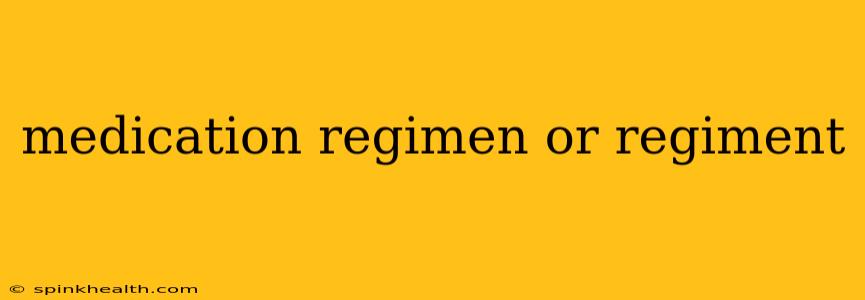The terms "medication regimen" and "medication regiment" are often confused, leading to uncertainty and potential misunderstandings, especially in healthcare settings. This article will clarify the distinction between these two words and help you understand their proper usage. It's a common question, and we'll explore it thoroughly.
Let's dive into the story of these similar-sounding words. Imagine you're a doctor, carefully crafting a plan for your patient's recovery. You wouldn't use just any words; the precision of language is crucial. This is where the difference between "regimen" and "regiment" becomes vital.
What is a Medication Regimen?
A medication regimen refers to a planned course of medical treatment. Think of it as a detailed roadmap outlining how and when a patient should take their medications. It includes specifics such as dosage, frequency, timing, and duration of treatment. This is the word you'll almost always see used in healthcare contexts. A regimen is a structured plan, designed to help achieve a specific health goal.
Example: "The doctor prescribed a medication regimen consisting of two pills twice daily for ten days."
What is a Medication Regiment?
The word "regiment" usually refers to a disciplined and highly organized body of soldiers. It implies strict control, order, and often, rigorous training. While you could theoretically use it to describe a very strict and organized medication schedule, it's grammatically incorrect and highly unusual in the context of healthcare. Using "regiment" when referring to medication would sound jarring and unprofessional. It would be like saying you're following a "military-style" medication schedule.
What’s the difference?
The core difference lies in the context and connotation. "Regimen" implies a structured plan, specifically for health, while "regiment" suggests strict military-style discipline and organization. In the context of medical treatment, "regimen" is the appropriate and widely accepted term.
Why is the distinction important?
Using the correct term, "medication regimen," is crucial for clear communication within the healthcare system. Using "regiment" would be confusing and potentially create misunderstandings between patients and healthcare professionals. Precise language is paramount in medical settings, impacting patient safety and treatment outcomes.
What if I see "medication regiment" used?
If you encounter "medication regiment" in writing, it is likely an error. The correct term is "medication regimen." You might even want to gently correct the usage if it’s in a publicly accessible document.
How do I create a medication regimen?
A medication regimen isn’t something you create yourself; it's tailored by a healthcare professional based on your individual needs and health condition. Your doctor or other qualified healthcare provider will determine the best course of action.
Is it important to follow my medication regimen exactly?
Yes! Following your medication regimen precisely as prescribed is vital. Skipping doses, changing dosages, or altering the schedule can negatively affect treatment effectiveness and potentially harm your health. Always consult your doctor before making any changes to your medication plan.
What if I have questions about my medication regimen?
If you have any questions or concerns about your medication regimen, it's essential to contact your doctor or pharmacist. They can clarify any uncertainties and ensure you understand your treatment plan completely. Open communication is key to successful treatment.
In conclusion, remember to always use "medication regimen" when discussing a planned course of medical treatment. Using "regiment" in this context is incorrect and potentially confusing. Clear and accurate communication is fundamental to effective healthcare.

